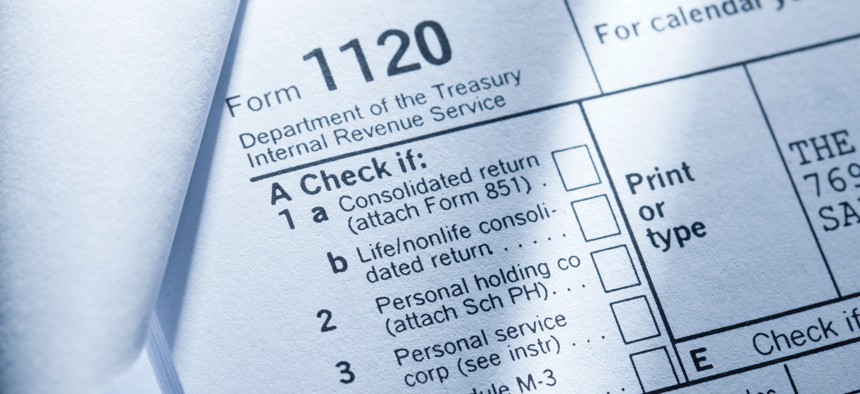How the IRS accidentally tagged thousands of taxpayers as dead
The IRS confirmed that 6,821 tax accounts were marked as deceased and locked — meaning that the agency wouldn’t process the tax returns associated with it — when the person was, in fact, alive.
The IRS has wrongly tagged at least 6,821 living people as dead, blocking thousands of taxpayers from filing their tax returns and getting refunds, according to an Aug. 7 report by the Treasury Inspector General for Tax Administration.
The process of locking a deceased person’s account is meant to prevent fraudsters from using stolen identity information to file returns and get benefits.
That 6,821 number of erroneously locked accounts is out of a larger batch of 9,646 accounts given an IRS notice that the primary or secondary taxpayer was deceased and therefore that the agency couldn’t process the tax return.
They were swept up in watchdog review as questionable because the Social Security Administration — the primary government agency that tracks death information — didn’t have a death date for them.
In total, 71% of the accounts that got these notices were “inappropriately locked,” according to the report.
TIGTA started its work on the subject after getting a referral about a taxpayer not being able to get their stimulus checks because they were marked as dead.
For the thousands of the living caught up in the mix, “when there is an error, the unintended consequence is that legitimate taxpayers cannot file a tax return and receive a refund,” the report notes. “These errors increase taxpayers’ burden to get the matter resolved as well as the IRS’s workload due to the receipt of additional telephone calls or correspondence from taxpayers.”
When the agency marks someone as deceased, it sends out a notice to the last known address that includes instructions for contacting the Social Security Administration if there’s been a mistake.
If a living person gets the notice, they have to contact the Social Security Administration and send the IRS a written request to unlock their account, a copy of the original notice from the IRS, a tax return and something to prove their identity, like a passport.
Out of 77,868 accounts the watchdog found to be potentially wrongly tagged as dead through the start of 2022, a total of 20,222 taxpayer accounts were erroneously locked, according to the report, meaning 74% of those tagged as potentially erroneous by TIGTA were actually locked appropriately.
Of the total 77,868 locked accounts, 9,646 were issued the notice that their tax return couldn’t be processed because of the lock on it.
The accounts were improperly locked, the IRS said, “because of both human and computer programming issues when identifying the appropriate taxpayer account to be locked.”
The watchdog also looked at Jan. 2, 2022, to Oct. 29, 2022, and found another 632 accounts that were sent notices about their accounts being locked when they potentially shouldn’t have been.
The IRS is still reviewing these more recently locked accounts, according to the report, and it’s also finishing its analysis of why this is happening, which will inform future training, guidance and other actions.
Kenneth Corbin, Commissioner of the IRS’ Wage and Investment Division, wrote in a response included in the report that “early in the last decade, bad actors lured by the increasing availability of refundable tax credits disbursed through the tax system, and using the stolen identities of individual victims, exponentially increased the rate of identity theft-related refund fraud.”
The IRS put measures in place to stop payments to deceased individuals in 2012, he said.
Beyond fraud alone, figuring out how to make sure that the IRS sends the correct, living people the right payments has also come up in more recent years. In May 2021, for example, CNBC reported that the tax agency had sent out around 4.5 million payments to people who didn’t qualify for them, with about half going to dead people.
The IRS gets most of its death information from the Social Security Administration, which in turn gets death information from state vital records offices.
But the tax agency can also tag people if their death comes up during collection activities or if a final return with a death date is processed, for example. The potentially erroneous account locks that are the subject of the report were made because of IRS actions.
To try to fix the problems found by TIGTA, the tax agency started a new method at the beginning of the year to annually reconcile death date information between itself and the Social Security Administration.
The IRS gets a comprehensive file with death data in June from the Social Security Agency, which it will run against its own records.
Then it can find accounts that have death dates in the IRS system, but not in the Social Security System, and send them to get manually reviewed. This year, it identified over 4,000 accounts for review.
The report came with several recommendations, which the tax agency agreed with, except one — for it to update the notice it sends, which the watchdog said “is placing undue burden on taxpayers to try and resolve the issue with the SSA, when the error may be due to actions taken by the IRS.”
The IRS, meanwhile, responded that “the majority of the notices are sent because taxpayer accounts are appropriately locked. It already provides the actions to take if an account has been locked in error, and includes language that taxpayers should not hesitate to contact us if assistance is needed.”
This isn’t the only grave area of concern for the government around death data.
Lawmakers and government officials have also been going back and forth for years over exactly who in the federal government should collect and share death data out to other agencies, a job currently held by the Social Security Administration.






